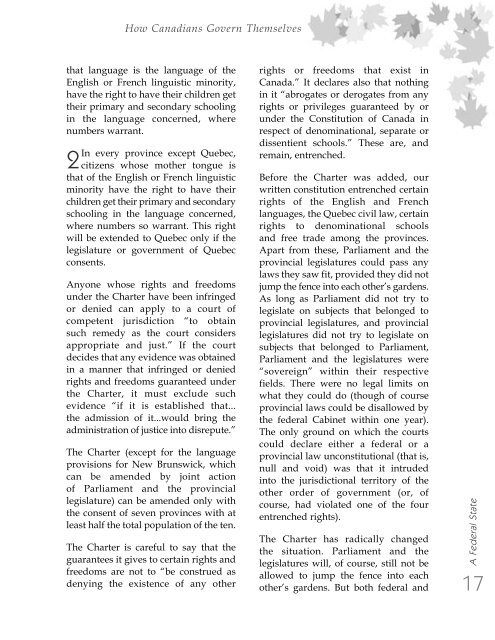How Canadians Govern Themselves - Parlement du Canada
How Canadians Govern Themselves - Parlement du Canada
How Canadians Govern Themselves - Parlement du Canada
Create successful ePaper yourself
Turn your PDF publications into a flip-book with our unique Google optimized e-Paper software.
<strong>How</strong> <strong>Canadians</strong> <strong>Govern</strong> <strong>Themselves</strong>that language is the language of theEnglish or French linguistic minority,have the right to have their children gettheir primary and secondary schoolingin the language concerned, wherenumbers warrant.2In every province except Quebec,citizens whose mother tongue isthat of the English or French linguisticminority have the right to have theirchildren get their primary and secondaryschooling in the language concerned,where numbers so warrant. This rightwill be extended to Quebec only if thelegislature or government of Quebecconsents.Anyone whose rights and freedomsunder the Charter have been infringedor denied can apply to a court ofcompetent jurisdiction “to obtainsuch remedy as the court considersappropriate and just.” If the courtdecides that any evidence was obtainedin a manner that infringed or deniedrights and freedoms guaranteed underthe Charter, it must exclude suchevidence “if it is established that...the admission of it...would bring theadministration of justice into disrepute.”The Charter (except for the languageprovisions for New Brunswick, whichcan be amended by joint actionof Parliament and the provinciallegislature) can be amended only withthe consent of seven provinces with atleast half the total population of the ten.The Charter is careful to say that theguarantees it gives to certain rights andfreedoms are not to “be construed asdenying the existence of any otherrights or freedoms that exist in<strong>Canada</strong>.” It declares also that nothingin it “abrogates or derogates from anyrights or privileges guaranteed by orunder the Constitution of <strong>Canada</strong> inrespect of denominational, separate ordissentient schools.” These are, andremain, entrenched.Before the Charter was added, ourwritten constitution entrenched certainrights of the English and Frenchlanguages, the Quebec civil law, certainrights to denominational schoolsand free trade among the provinces.Apart from these, Parliament and theprovincial legislatures could pass anylaws they saw fit, provided they did notjump the fence into each other’s gardens.As long as Parliament did not try tolegislate on subjects that belonged toprovincial legislatures, and provinciallegislatures did not try to legislate onsubjects that belonged to Parliament,Parliament and the legislatures were“sovereign” within their respectivefields. There were no legal limits onwhat they could do (though of courseprovincial laws could be disallowed bythe federal Cabinet within one year).The only ground on which the courtscould declare either a federal or aprovincial law unconstitutional (that is,null and void) was that it intrudedinto the jurisdictional territory of theother order of government (or, ofcourse, had violated one of the fourentrenched rights).The Charter has radically changedthe situation. Parliament and thelegislatures will, of course, still not beallowed to jump the fence into eachother’s gardens. But both federal andA Federal State17




